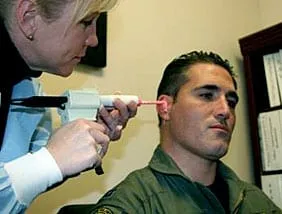Hearing is one of our most important senses — it connects us to the people, places, and experiences we love. Yet, many people don’t know exactly what an audiologist does or how they fit into the broader world of hearing healthcare. As a practicing audiologist, I often hear the same joke when I introduce myself: “What?” — and while it’s funny, it highlights how little the average person knows about my profession.
In this complete guide, we’ll cover:
- What an audiologist is and their qualifications
- The critical role audiologists play in hearing healthcare
- Key differences between audiologists, ENTs, and hearing aid specialists
- Services audiologists provide
- FAQs about seeing an audiologist
What Is an Audiologist?
An audiologist is a licensed healthcare professional specializing in the diagnosis, treatment, and prevention of hearing and balance disorders. They hold either a Doctor of Audiology (Au.D.) degree or, in some cases, a master’s degree, and must complete extensive clinical training.
Audiologists work with patients of all ages, from newborns to older adults, helping to detect hearing loss early, fit and program hearing aids, and provide strategies for maintaining long-term hearing health.
The Importance of Audiology in Hearing Healthcare
With over 1.5 billion people worldwide experiencing some degree of hearing loss (World Health Organization, 2024), the role of audiologists has never been more essential. Untreated hearing loss is linked to social isolation, cognitive decline, and reduced quality of life.
In addition to diagnosing hearing loss, audiologists provide counseling, education, and individualized treatment plans. They also specialize in the prevention of noise-induced hearing loss — an increasingly common problem in our technology-driven world.
Services Offered by Audiologists
Audiologists are highly trained to provide a variety of hearing and balance-related services, including:
- Comprehensive hearing evaluations
- Hearing aid fittings using real ear measurement to ensure accuracy
- Tinnitus management
- Balance and vestibular disorder testing
- Custom hearing protection for musicians, swimmers, and workers
- Assistive listening device recommendations
- Counseling on hearing health and maintenance
Audiologist vs ENT vs Hearing Aid Specialist
While all three professionals can help with hearing concerns, their training, scope of practice, and services differ significantly.
| Audiologist | Hearing Aid Specialist | ENT (Ear, Nose, and Throat Doctor) | |
|---|---|---|---|
| Education | Doctor of Audiology (Au.D.) or Master’s degree + clinical fellowship | Certification in hearing aid fitting, typically no medical degree | Medical degree (MD/DO) + residency in otolaryngology |
| Scope | Diagnose & treat hearing and balance disorders; fit hearing aids | Fit and sell hearing aids | Diagnose & treat ear, nose, and throat conditions; perform surgery |
| Services | Hearing tests, hearing aid fitting, tinnitus treatment, balance testing | Hearing aid sales, fittings, adjustments | Medical treatment, surgery, management of complex ear disorders |
If your primary concern is hearing loss and you need a custom-fit hearing solution, an audiologist is often the best starting point. If there’s a medical or surgical issue — such as ear infections, tumors, or structural problems — an ENT is the right choice.
Why See an Audiologist First?
When it comes to hearing care, the sooner you act, the better the outcome. Audiologists offer:
- Expertise in hearing aid technology
- Evidence-based treatment plans
- Comprehensive follow-up care
- Preventive strategies to protect hearing
In my professional opinion, being fit with hearing aids by an audiologist will give you the best results for your hearing and quality of life.
FAQs About Audiologists
Do audiologists remove earwax?
Yes. Many audiologists are trained to safely remove earwax using specialized tools and techniques.
Do I need a referral to see an audiologist?
In most states, no referral is needed. However, some insurance plans may require one.
Can audiologists treat tinnitus?
Yes. Audiologists can evaluate tinnitus and provide sound therapy, hearing aids, and coping strategies.
Are audiologists doctors?
Yes — most audiologists today hold a Doctor of Audiology (Au.D.) degree, which is a clinical doctorate.

